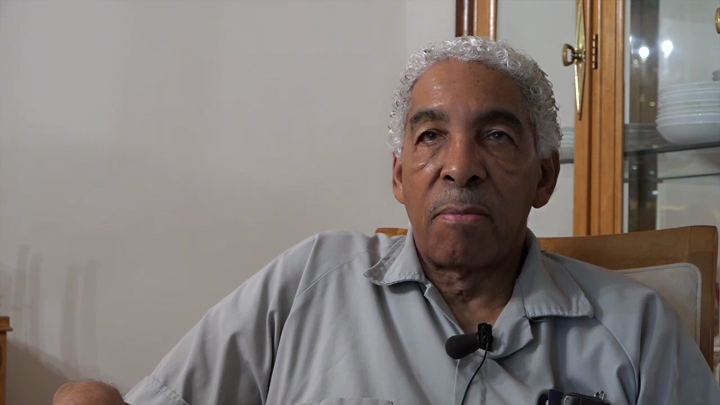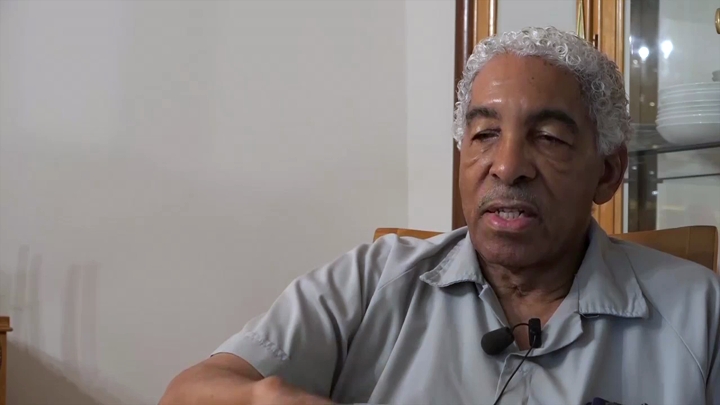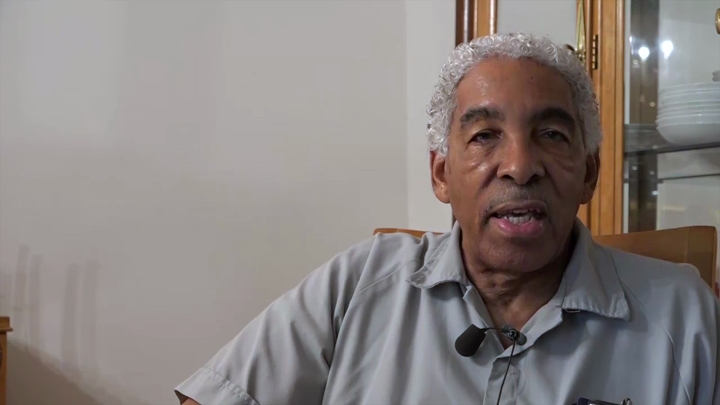Cross / Marine Corps Opportunities and Placement, Experience
sign up or sign in to add/edit transcript
Cross: But it was integrated and everything. It was about—I don’t know how many blacks in there, but some of them, you have competition with other platoons and then you have to drill. I don’t know what you call it, but it’s a big old field and all these platoons would be out there marching. They’d have judges and everything. So, we got the honor platoon for our marching and everything, and you get a little old guard on for the best platoon in camp. So, we got that, but we left about six or eight of the Marines at the barracks because they couldn’t tell their left foot from their right foot, so we left some there. So, we got the platoon—honor platoon. Then when these other platoons would see you with that flag, they’d all be watching because we’d be walking down all proud and stuff. So that was my experience. One was when they took us to the gas chamber and we put on a gas mask when we went in. Then they made us pull them off and sing the Marine Corps Hymn. This is tear gas and we were all crying. They did some silly stuff in the Marine Corps. We were all crying when we came out because they made us pull off our mask. So that was some of my experiences in the Marine Corps. Then I went to radio school. I think it was about maybe fifty or maybe seventy in that radio school and the top ten that got the highest score in radio school, you could pick your duty station. So, I was in the top ten. Then, some of my friends were in the top ten too so we discussed it. I said, “You know the Korean War is going on. We on the West Coast. Let’s pick something on the East Coast to just get away from here.” So, we did, and a boy named Eugene Chandler from Martinsville, OH. He was white. Then there was Ed Walker from Chicago. He was black. He scored high on the test. Lloyd Dumas from Chicago. He was German white. He scored high on the test. (inaudible) Hedge. He was German. He scored high on it. So, we were in the top ten, so we said let’s all pick Camp Lejeune, North Carolina and we all picked it. So, we all went from the West Coast to the East Coast. We got there, and we didn’t know who was going where. So, my assignment was in division and I was a radio operator for the generals. Ed got in tanks. (inaudible) was just in a company. Lloyd Dumas was in just a company. So, I got the best deal because I worked with the generals all the time. I just operate the radios and they would remote it in to the command post and I’m sitting out here with all these radios, just four of us and that’s what we did.
| Interview | Interview with Herbert Cross |
| Subjects | Military › Korean War |
| Military › Better Race Relations in the Military | |
| Military › Home Front | |
| Military › Military Bases and Posts | |
| Tags | Chandler, Eugene |
| Walker, Ed | |
| Demass, Lloyd | |
| Marine Corps Base Camp Lejeune | |
| Military Integration | |
| Honor Platoon | |
| United States Marine Corps | |
| Tear Gas chamber | |
| Radio School, Marine Corps | |
| East Coast | |
| Camp Lejeune, North Carolina | |
| sign up or sign in to add/edit tags | |
| Interview date | 2016-06-20 |
| Interview source | CRBB Summer 2016 |
| Interviewees | Cross, Herbert |
| Interviewers | May, Meredith |
| Locations | San Diego, CA |
| Jacksonville, NC | |
| Duration | 00:04:25 |
| Citation | "Marine Corps Opportunities and Placement, Experience," from Herbert Cross oral history interview with Meredith May, June 20, 2016, Lufkin, TX, Civil Rights in Black and Brown Interview Database, https://crbb.tcu.edu/clips/2392/the-marine-corp-opportunities-and-placement, accessed March 04, 2026 |




